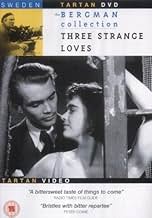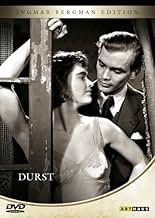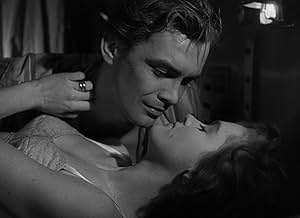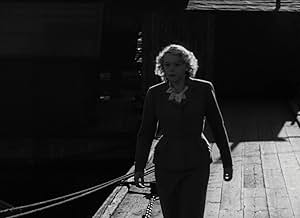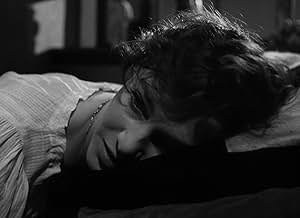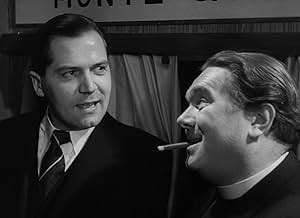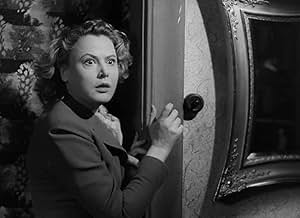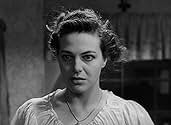IMDb RATING
6.5/10
3.1K
YOUR RATING
A needy couple in a bad marriage travel back to Stockholm after a trip to Italy. Meanwhile, a widow resists seductions from two different persons - her psychiatrist and a lesbian friend.A needy couple in a bad marriage travel back to Stockholm after a trip to Italy. Meanwhile, a widow resists seductions from two different persons - her psychiatrist and a lesbian friend.A needy couple in a bad marriage travel back to Stockholm after a trip to Italy. Meanwhile, a widow resists seductions from two different persons - her psychiatrist and a lesbian friend.
- Director
- Writers
- Stars
Mimi Nelson
- Valborg - Ruts kamrat i balettskolan
- (as Mimmi Nelson)
Wiktor Andersson
- Doorkeeper
- (uncredited)
Verner Arpe
- Tysk biljettsamlare
- (uncredited)
Ingmar Bergman
- Tågpassagerare
- (uncredited)
Britta Brunius
- Sjuksköterskan efter Ruts abort
- (uncredited)
Calle Flygare
- Den danske prästen på tåget
- (uncredited)
Inga Gill
- Lady at Hotel
- (uncredited)
Herman Greid
- Stadsbudet i Basel
- (uncredited)
Helge Hagerman
- Den svenske prästen på tåget
- (uncredited)
- Director
- Writers
- All cast & crew
- Production, box office & more at IMDbPro
Featured reviews
Bergman's first foray into marriage - a long visited topic for him. Moving on from a previously familiar summer holiday romance scenario that ends in pregnancy termination, the story shows how the now sterile ex ballet dancer faces frustrations with her new husband. The married soldier that was the subject of her affair (I presume he was killed in action), leaves a widow who comes to haunt her, in spirit and in body.
For Bergman, we see his first slightly bleached-out ultra close up and face to face shot. The psychiatrist too makes a first appearance as emotional damage is pursued as a topic. There's also quite a bit of flash-backing and a train journey that runs through most of it which is supposed to symbolise both a passage in time but also the empty, barren vessel she now feels herself to be.
The distinctively intelligent dialogue that so appeals to me is sharp and acerbic, probably for the first time. "I only stay alive so I can keep you as miserable as you've always kept me" is typical of Ingmar's angst. Subtleties of depressive subjects such as suicide are shown by someone leaping to their death into water but all we hear is a plover or some-such seabird changing its call.
A little lumpy in its narrative but for those who love Bergman, the gems are starting to shine and we are reassured by the burgeoning qualities of who we now know to be one of the World's greatest ever directors.
For Bergman, we see his first slightly bleached-out ultra close up and face to face shot. The psychiatrist too makes a first appearance as emotional damage is pursued as a topic. There's also quite a bit of flash-backing and a train journey that runs through most of it which is supposed to symbolise both a passage in time but also the empty, barren vessel she now feels herself to be.
The distinctively intelligent dialogue that so appeals to me is sharp and acerbic, probably for the first time. "I only stay alive so I can keep you as miserable as you've always kept me" is typical of Ingmar's angst. Subtleties of depressive subjects such as suicide are shown by someone leaping to their death into water but all we hear is a plover or some-such seabird changing its call.
A little lumpy in its narrative but for those who love Bergman, the gems are starting to shine and we are reassured by the burgeoning qualities of who we now know to be one of the World's greatest ever directors.
While Ode to Joy is undoubtedly the gem of Eclipse's Early Bergman box set, Thirst is a close second, at least in my mind. It's kind of a precursor to Scenes of a Marriage, where the story follows a married couple (played by Eva Henning and Birger Malmsten) on a train trip through war-torn Europe. The tumult of the film comes not from the mostly ignored outside world, but from the rocky marriage itself. We also get glimpses of the couple's former lovers. The film is at its best when sticking to the couple. When it strays to the stories of side characters, it's weaker. Since the film is so short (just over 80 minutes), you have to wonder if some of the tangential stories were added as padding. But even the scenes that don't add much are well written, acted and directed. Henning gives a masterful performance, and Bergman was really coming into his own by this point.
Interesting film, but this is clearly not the very best of the great Bergman. Several relationships are examined under the microscope (so far, so Bergman). The film jumps around between the relationships in a slightly distracting way, but eventually you get to the bottom of who used to be with whom etc.
Gosh it's bleak out there, Bergman seems to share Strindberg's views on marriage and relationships at this time - the references to Strindberg stress that point. There's adultery, bitter rows between partners, lesbianism (inexplicit) and suicide. It ought to have me at the edge of my seat, but somehow doesn't quite do the business for me in the way that most Bergman films do. Perhaps this one hasn't aged well.
Worth seeing for the dedicated Bergman fan - it's pretty short and has its moments. If you are looking for an initial view of Bergman, look elsewhere.
Gosh it's bleak out there, Bergman seems to share Strindberg's views on marriage and relationships at this time - the references to Strindberg stress that point. There's adultery, bitter rows between partners, lesbianism (inexplicit) and suicide. It ought to have me at the edge of my seat, but somehow doesn't quite do the business for me in the way that most Bergman films do. Perhaps this one hasn't aged well.
Worth seeing for the dedicated Bergman fan - it's pretty short and has its moments. If you are looking for an initial view of Bergman, look elsewhere.
I thought I had seen every Bergman film ever made, so I was thrilled to stumble onto this one the week after he died. I had no trouble following the intertwining stories because I kept track of the characters' names and their relationships. So what confused many viewers seemed totally justified, especially compared to films in our post-Altmam era where more and more we see "stories" where seemingly unconnected people's lives crisscross and are junxtaposed ("Magnolia," and "Babel" to name a few).
The filming is fantastic for the time and prefigures the use of close ups in "Through a Glass Darkly." Very different from "Port of Call" just before and "To Joy" just afterwards. I found the film less bleak than "Prison," its lyrical moments prefiguring "Summer Interlude," one of my favorite early Bergmans.
The lesbianism was blatant enough for me, much more obvious than in "Young Man With A Horn," made around the same time in the US. Curiously, this section of the film helped illuminate Bergman's use of the theme in "The Silence," and this makes me want to view that film again. The fact that this is a film Bergman didn't write is intriguing, because he harmonizes his visual language to the rhythms of the screenwriter's oral one. The dialog was rather light for the seriousness of the situations. Perhaps Bergman himself would have been heavier-handed.
Lastly, there are the actresses, and here Bergman's direction of actors seems to solidify, as I find his previous films much more uneven on this score. Here the women, especially the young dancer, show real depth.
Keep in mind that this is not his first film, but still an early work, a seed that will grow into later masterpieces. Then you won't be disappointed, even after the mediocre last minutes of a work that definitely showed promise.
The filming is fantastic for the time and prefigures the use of close ups in "Through a Glass Darkly." Very different from "Port of Call" just before and "To Joy" just afterwards. I found the film less bleak than "Prison," its lyrical moments prefiguring "Summer Interlude," one of my favorite early Bergmans.
The lesbianism was blatant enough for me, much more obvious than in "Young Man With A Horn," made around the same time in the US. Curiously, this section of the film helped illuminate Bergman's use of the theme in "The Silence," and this makes me want to view that film again. The fact that this is a film Bergman didn't write is intriguing, because he harmonizes his visual language to the rhythms of the screenwriter's oral one. The dialog was rather light for the seriousness of the situations. Perhaps Bergman himself would have been heavier-handed.
Lastly, there are the actresses, and here Bergman's direction of actors seems to solidify, as I find his previous films much more uneven on this score. Here the women, especially the young dancer, show real depth.
Keep in mind that this is not his first film, but still an early work, a seed that will grow into later masterpieces. Then you won't be disappointed, even after the mediocre last minutes of a work that definitely showed promise.
Raul's a dislikeable chap, gets the feeling that he's being trapped, in the blink of an eye, it's adios, goodbye, marches off vowing not to come back.
Ruth is quite high maintenance, takes everything that you can dispense, she'd turn you to a husk, grinding you down to dust, at her mercy without strong defence.
Bertil's nightmare hasn't come true, the bottle he threw he withdrew, a small recompense, brings him back to sense, but next time he might not wake to two.
Valborg plays life solitaire, her secret her shame not to share, though with Eva she tries, it all ends in surprise, back to solitude with no one to care.
Eva is lost all alone, a vulnerable hand she's been sown, now she's starting to fade, as she tries to evade, cascades to the depths as if blown.
Several intertwined strands reflect the frailties, the ignorance and the disappointments we've all encountered at some time or another - although hopefully with a little less melodrama.
Ruth is quite high maintenance, takes everything that you can dispense, she'd turn you to a husk, grinding you down to dust, at her mercy without strong defence.
Bertil's nightmare hasn't come true, the bottle he threw he withdrew, a small recompense, brings him back to sense, but next time he might not wake to two.
Valborg plays life solitaire, her secret her shame not to share, though with Eva she tries, it all ends in surprise, back to solitude with no one to care.
Eva is lost all alone, a vulnerable hand she's been sown, now she's starting to fade, as she tries to evade, cascades to the depths as if blown.
Several intertwined strands reflect the frailties, the ignorance and the disappointments we've all encountered at some time or another - although hopefully with a little less melodrama.
Did you know
- TriviaThe first of three theatrical films directed by Ingmar Bergman that he did not write.
- Alternate versionsThe Tartan region 2 DVD restores the ending of the scene between Viola and her lesbian former schoolmate Valborg, in which the latter tries to seduce the former by getting her drunk. This had been cut by the Swedish censors before the film's original release and had never been seen publicly before 2004.
- ConnectionsReferenced in Dårskapens hus (1951)
- SoundtracksNon più andrai
(uncredited)
from "Le nozze di Figaro"
Music by Wolfgang Amadeus Mozart
Swedish Lyrics by Bernhard Crusell
Sung by Bengt Eklund
- How long is Thirst?Powered by Alexa
Details
- Runtime
- 1h 23m(83 min)
- Color
- Aspect ratio
- 1.33 : 1
Contribute to this page
Suggest an edit or add missing content

